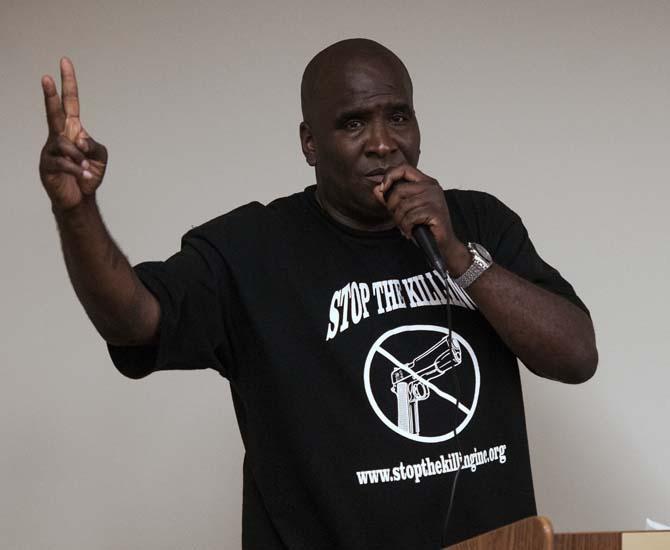Arthur Reed was headed to jail by the time he was in seventh grade. When he was released at 19-years-old, he was heavily involved in gangs and tried to commit suicide three times.
Reed’s self-described thug lifestyle changed after a life-threatening car collision in 2003, when he realized life was too precious to make bad decisions. Now, Reed is a motivational speaker and philanthropist.
Reed, better known as “Silky Slim,” founded Stop The Killing, Inc., a non-profit established to set at-risk youth on a path to success.
The organization’s mission, Reed said, is to deter youth from getting into gangs and going to prison by teaching effective communication and conflict resolution skills.
Another one of Reed’s missions: ending racial profiling.
Reed spoke to an intimate group of students Thursday night at the African American Cultural Center about racial profiling and ways to rise above it.
“The first step to overcome racial profiling is to recognize that you are being fed it,” Reed said.
Reed defines racial profiling as any individual who judges an individual based on race, actions and skin color. Racial profiling paints the picture that minorities are inferior to everyone else because it is a socially engineered problem, he said.
African-Americans must stray away from emulating rappers and supporting networks like Black Entertainment Television because they are products not owned by African-Americans, and those cultures are feeding “garbage, filth and trash” to African-Americans, Reed said.
“The change starts with us,” Reed said. “We become what we digest. You can’t put trash in your system.”
Being an educated individual is not the ultimate solution to eliminate racial profiling because, according to Reed, you can still be a slave to the system even with a college degree. It’s about perception, he said.
“You have to be strong enough to understand who you are and your roots,” Reed said. “If we can’t check ourselves, we can’t take our message to the people.”
Spanish junior Wendell Shelby-Wallace said the lecture was inspiring and influential.
“It allowed me to see African-Americans as we profile ourselves,” Shelby-Wallace said.
Vocal performance freshman DeAundre Woods attended Reed’s event and said the key to stopping racial profiling is for African-Americans to stop tearing each other down.
“We have to stop identifying with what we see on television and social media,” Woods said.
The lecture concluded with a walk to the Parade Grounds where black balloons were released to honor victims who died as a result of racial profiling.
When Reed isn’t giving lectures at LSU or Temple University or Stanford University, he has his own radio talk show, the Stop The Killing Hour of Power on Max 94.1 FM every Sunday at 4 p.m.
“The change starts with us.”
Baton Rouge man on mission to stop racial profiling
September 12, 2013
Arthur ‘Silky Slim’ Reed, Vice President of Stop the Killing, Inc. speaks on Thursday, September 12, 2013, during the #WEARENOTSUSPECTS event in the African American Cultural Center on campus.






